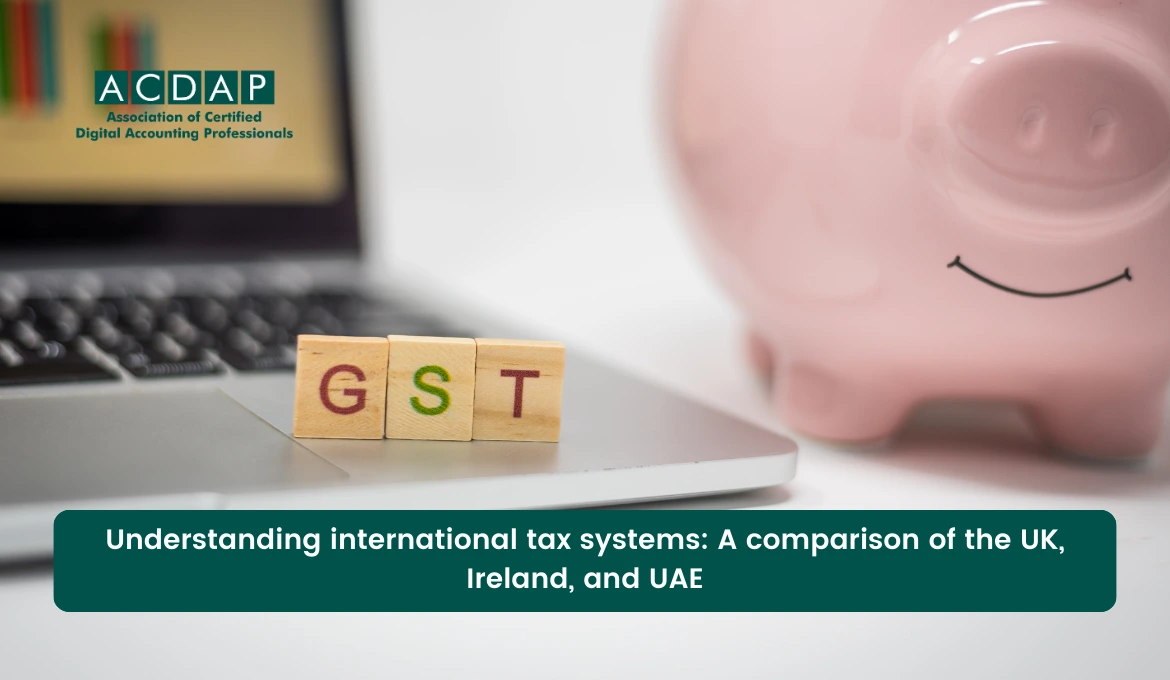Different countries have vastly different tax systems. Business and personal activities across international boundaries require a good understanding of these differences. This article presents a comparison of the tax systems of the UK, Ireland, and the UAE in respect of their characteristics.
1. Tax Systems Overview
- United Kingdom: The UK also has a sophisticated tax system, with various kinds of tax-tax on income, corporate tax, value-added tax, and VAT. The tax charges are progressive-people who earn more pay a percentage of their income to the taxman. There is also a capital gains tax in the UK for profits gained from selling some assets.
- Ireland: Ireland has the lowest corporate tax of 12.5%. That is why most multinational companies are attracted to it. For these two, UK is not alone; income tax and VAT are also present here. The difference in tax rates is negligible. Once again, Ireland promotes business development by offering tax benefits for research and development and so on.
- United Arab Emirates: The UAE has a different tax system, primarily because the country does not collect personal income tax. Instead, it relies on corporate taxes, which are considerably lower than those applied in other countries. There is a plan to introduce a corporate tax rate of 9% on surplus profits over AED 375,000 or approximately $102,000 starting June 2023, making it an excellent destination for businesses. The UAE also applies VAT at the rate of 5%.
2. Corporation Taxation
- UK: The UK corporate tax rate currently stands at 19% and is due to increase to 25% for companies with profits over £250,000. In addition to this, the UK has various reliefs and allowances to reduce taxable profits, including research and development tax credits.
- Ireland: Another reason is the low corporate tax rate of 12.5%. It also has a "Knowledge Development Box," with a lower rate of 6.25% on intellectual property profits.
- UAE: As can be observed, the UAE has just implemented a 9% corporate tax on profits above AED 375,000. Still, most industries, like oil and gas companies, as well as foreign banks, will have even bleaker rates. Besides, there are several free zones in the UAE which permit a business to operate with no corporate tax at all.
3. Personal Taxation
- UK: The income taxation in the UK is progressive. In the fiscal year 2023/24, this rate is 20% of the basic rate, 40% for the higher rate, and 45% for earnings over £150,000. Of course, there is national insurance to pay as well.
- Ireland: The tax system in Ireland is also progressive income taxation: 20% and 40%. There are also various tax credits and reliefs to reduce the total tax burden, such as the Earned Income Tax Credit.
- UAE: No personal income tax is charged in the UAE. This lack of personal taxation makes the UAE a very attractive destination for expatriates and high earners.
4. Value-Added Tax (VAT)
- UK: The UK has a normal VAT at 20%, while all other foods and children's clothing attract reduced rates. Registration is of necessity for businesses whose turnover exceeds £85,000.
- Ireland: Ireland applies a standard VAT rate of 23%. Reduced rates are applied on certain food items and children's clothing. Businesses must register for VAT if they have a business turnover above €75,000.
- UAE: The UAE has set a VAT rate of 5%, one of the lowest rates in the region. VAT was presented in 2018 to attempt to diversify government revenue sources away from oil dependency.
Conclusion
One needs to understand the tax systems of the UK, Ireland, and UAE, which form an important basis for businesses and individuals who are interested in working with these countries. The UK has a very complex and progressive system. In Ireland, one finds that low corporation taxes are being offered to attract business. The UAE is unique because there is no personal income tax, and corporate tax rates are pretty low. Each system has its merits and demerits, and proper planning is required to navigate through these international tax landscapes in an efficient manner.


























